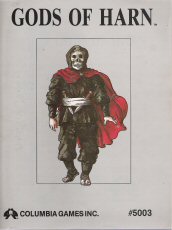The Gods & Spheres of Influence
 Hârnians
acknowledge the existence of many gods, all of whom have unique
aspects, epithets, dispositions, and concerns.
Hârnians
acknowledge the existence of many gods, all of whom have unique
aspects, epithets, dispositions, and concerns.
Though the gods may differ, Burning Wheel's Faith rules can be used for all of them without any deity-specific customization. (Please see the Faith Overview page for more details.)
For GMs/groups who prefer deity-by-deity variation in how Faith works, however, the Religion rules (pp. 54-62 in the Magic Burner) provide guidelines for assigning deities spheres of influence to represent the areas of the natural world and human existence over which they hold sway.
This page provides general suggestions for applying these spheres of influence to Hârn's gods. There are also separate pages listing spheres of influence for the Hârnic Pantheon and the Gods of Hârn's Barbarian Tribes.
Modifiers for Spheres of Influence
As noted on the sidebar, GMs/groups can use spheres of influence to assign modifiers to Faith tests, based on whether a given prayer is related to the god's assigned spheres. If pursuing this approach, I would suggest the following modifiers:
Advantages:
- +1D for a prayer that unambiguously involves one or more of
the god's spheres (Example: asking Halea for success in a seduction
attempt).
- +2D if the prayer clearly involves two or more of the god's spheres (Example: asking Ilvir for aid in carving a sculpture of an Ivashu.)
Disadvantages:
- +1 Ob. if a request is unrelated to any of a god's
spheres of influence. (Example: praying to Save-K'nor for success
in battle)
- +2 Ob. (or higher) if the request is antithetical to the god's sphere's of activity (Example: a prayer for Peoni, the goddess of healing, to unleash a plague on a village.)
In cases, where a prayer seems only tangentially related to one of a gods sphere's (Example: praying to Sarajin to heal an injured warrior), treat it as a straight test based on standard obstacles, without any modifiers.
Faith Failure & Spheres of Influence
A god's spheres of influence can be used to help determine consequences of failed Faith tests.
(Example: Agrik is a god of war, fire and pain. An Agrikan priest prays for aid before a battle, but fails the Faith test. This could mean that the requested aid is still given, but that Agrik demands that all prisoners be burned alive or tortured to death as an after-battle sacrifice. If the priest fails to comply, he will be isolated per p.53 of the Magic Burner.)